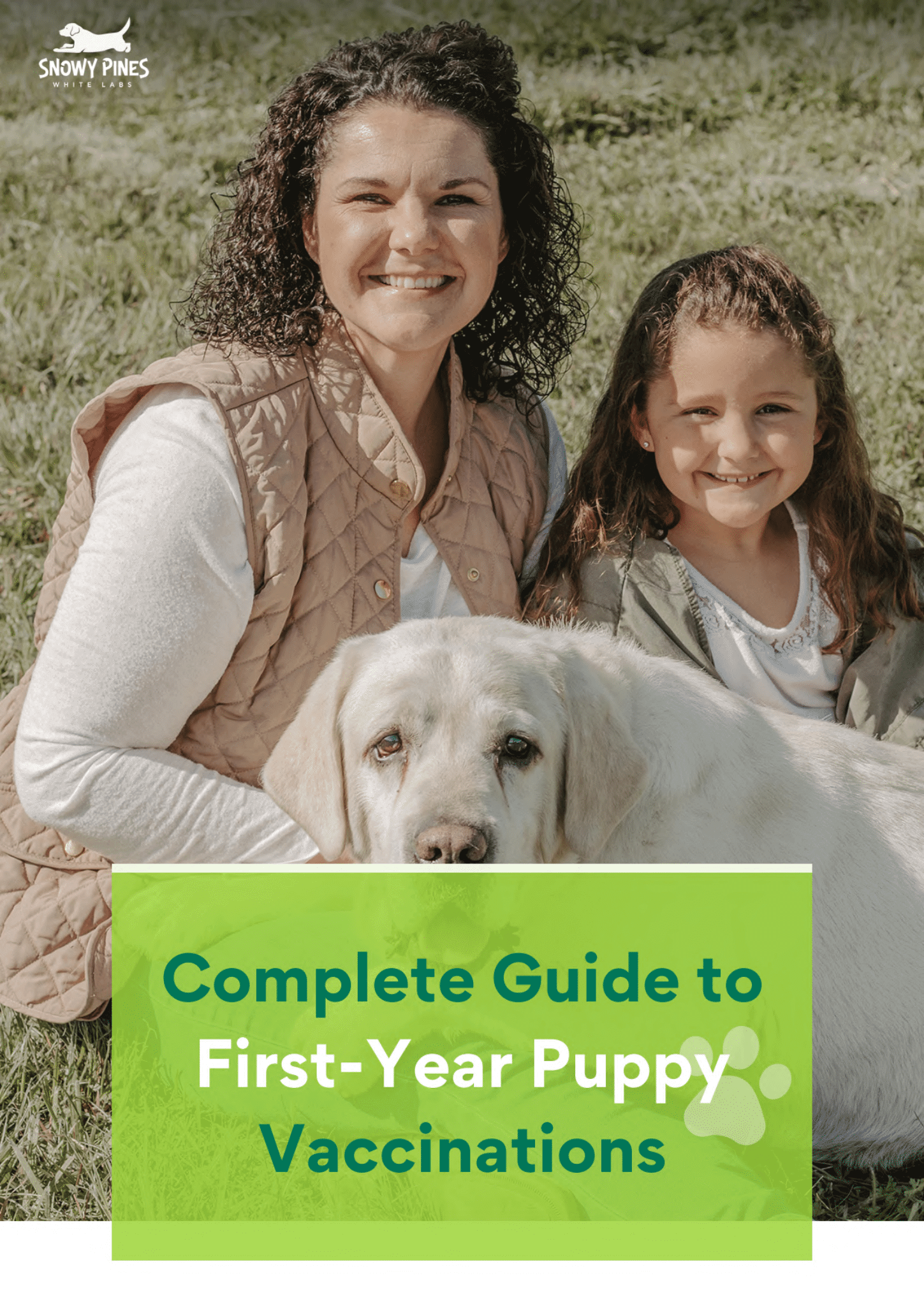The most common non-core vaccines protect against Lyme disease, Leptospirosis, and Bordetella (kennel cough).
Core Vaccines
Non-Core Vaccines
- DHPPi (distemper, hepatitis, parvovirus, parainfluenza)
- Rabies
- Lyme disease
- Leptospirosis
- Bordetella
Here’s a detailed breakdown of the essential core and basic non-core vaccines you should schedule for your puppy within the first year of life.
Distemper (CDV)
Distemper is a virus that attacks the nervous system and causes bodily malfunction like seizures, paralysis, muscle twitches, head tilt, and convulsions. It is spread through airborne exposure and can be transmitted by shared food and water bowls, toys, or other equipment.
Distemper is a risk for all dogs, but unvaccinated puppies under four months old are especially susceptible. There is no cure for distemper, so dogs with this disease will require lifetime supportive care.
Hepatitis (CAV1 and CAV2)
Hepatitis Type 1 is an acute contagious disease caused by the canine adenovirus 1 that targets the spleen, kidneys, lungs, blood vessels, and other organs.
It is spread through the urine, saliva, and feces of an infected dog, meaning that any dog that sniffs, licks, or breathes in the same area as an infected dog may contract the virus within four to seven days. It is usually treatable and curable if caught when the disease is still acute. However, Hepatitis Type 2 is not.
Hepatitis Type 2, also called canine chronic hepatitis, is the same virus as Type 1 but has been present for much longer and is more dangerous because it becomes untreatable.
It’s estimated that dogs with chronic hepatitis can survive between 18 to 36 months. If left untreated, the dog may progress to severe chronic hepatitis which projects a shorter survival time and more severe symptoms.
Parvovirus (CPV)
Parvovirus is a highly infectious disease that attacks the intestines so they can’t absorb essential nutrients anymore. It spreads through direct contact and contact with contaminated feces, environments, people, or even objects like furniture, clothing, floors, or bowls.
There is no cure for parvo, but your dog has a near-zero percent chance of ever contracting it — unless they’re around unvaccinated dogs and they remain unvaccinated as well.
Canine Parainfluenza (CPiV)
Canine parainfluenza is a contagious respiratory virus that causes lung infections, leading to lethargy, coughing, sneezing, and worse symptoms if left untreated. It closely resembles the symptoms of canine influenza, but it’s important to note that these are different viruses and require a different vaccine.
It is airborne and can also spread through saliva, so parainfluenza is common among dogs in kennels, daycares, and shelters. However, it can also spread at everyday places like dog parks, vets, groomers, or playtime with other dogs.
Rabies
Rabies is a viral infection that affects the specific brain receptors that influence an animal’s behavior, usually causing unusually aggressive and violent behaviors. Rabies is transmittable through saliva and is generally passed through a bite wound from an infected animal, like bats, raccoons, coyotes, foxes, and skunks.
There is no cure for rabies, and it is usually fatal within just a few days. Unfortunately, it’s impossible to test for an active rabies infection on a live animal, so your puppy must get their rabies vaccination at 12 weeks old.
Lyme Disease
Lyme disease is a bacterial illness transmittable to humans, dogs, cats, and other animals by the black-legged or deer tick. It spreads through infectious tick bites that are most common in the Northeastern, Upper Midwest, and Mid-Atlantic states of the United States where the species is most common.
The Lyme disease vaccine is recommended for dogs who spend time outdoors, especially those who live in these hotspots.
Leptospirosis
Leptospirosis is an infectious disease affecting dogs, humans, and other animals. It is carried by raccoons, skunks, squirrels, opossums, deer, rodents, and marsupials and spread through infected animals’ urine via contaminated water, mud, or warm, wet soil.
Although the lepto vaccine is not a required immunization for dogs, most vets will recommend it for dogs that spend any time outside.
Bordetella
Bordetella, also called kennel cough, is a highly contagious respiratory disease that inflames the throat and lungs that is especially risky for puppies, elders, and immunocompromised dogs.
The name kennel cough comes from how it’s most commonly spread through proximity to other dogs, like in kennels, dog parks, or daycares. It is easily transmittable through coughs (saliva) or sharing contaminated surfaces.
Fortunately, kennel cough is relatively treatable—but can leave room for uncomfortable symptoms, such as lethargy, fever, sneezing, coughing, and more.


